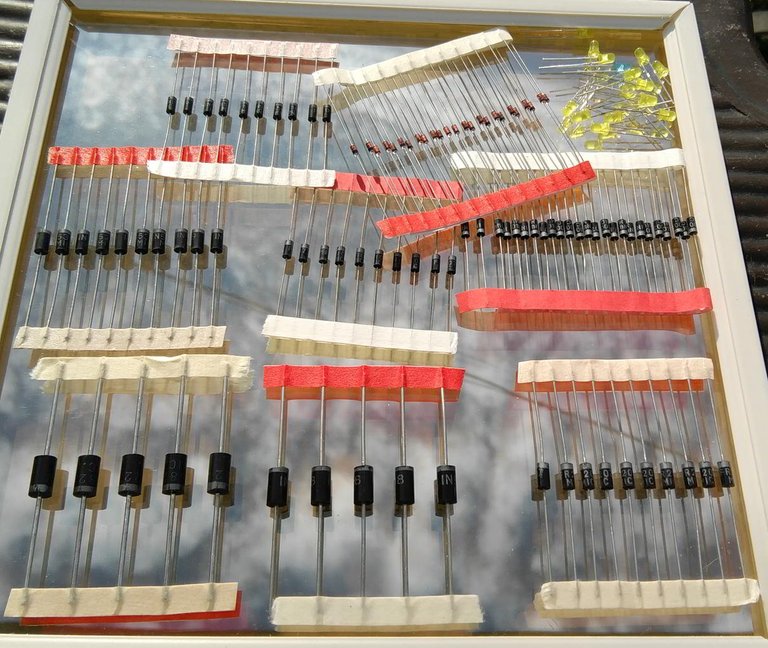Greetings everyone,
Beginning today, I'm starting a series of articles on electronics. I'm actually a software guy but have been interested in electronics and been tinkering with it since childhood. I'm trying to create a new career path by creating courses on electronics and software and it involves a hours and hours of research and learning. So I thought I might as well share the knowledge. I hope you find this useful.
What you will find in this guide:
Practical knowledge which might take you hours or days to find out. Nothing very advanced, as I'm not an experienced electronics or electrical engineer myself, but just what you need if you are going to dive into electronics.
What you will not find:
Theoretical explanations which you can easily find by yourself. I might link it here though.
Today I'm going to talk about diodes.

These are the black cylindrical doodads you can find on through hole boards. On modern PCBs, you will find them int the form of small black SMD devices with a silver band at one end.
Diodes are the simplest semiconductor devices, which allow current to flow in only one direction. Well, it's actually more complicated than that, and we will discuss the subtleties later. If you are interested in how they work, read this Wikipedia article.
The first thing you need to know about diodes is that they can be in forward or reverse bias modes.
A diode is said to be in forward bias mode when it is placed in a circuit such that it starts conducting when the voltage is above its cut-in voltage. The built in potential is in reverse compared to direction of flow of current. Go to the link posted above if you want to understand what that means.
A diode is in reverse bias mode when it is placed such that it stops the flow of current. The internal potential is aligned in the same direction as the conventional flow of current (which is opposite to the direction of movement of electrons).
So lets discuss the different types of diodes:
Switching signal diodes.
IN4148s are the most common. They can handle current up to only 200mA, but can switch at very high speeds, upto 100MHz. Optimal for logic circuits.General purpose diodes.
These are used in rectification to turn AC to DC, and in circuits where you want the current to flow in only one direction.
1N400x series is common for hobby use. It ranges from IN4001 - IN4007, which can handle current upto 1A, at 50V - 1000V respectively. IN540x are 3A versions.Zener Diodes
They have a fixed breakdown voltage in reverse bias, usually below 5v, and are often used as a crude and cheap voltage regulator.Schottky diodes
Have very low leakage current. Not very good in reverse bias mode though.Light Emitting Diodes
Yup, the humble ubiquitous LEDs. They're diodes as well. They have no current limiting, so require a resistor in series.
Real life limitations:
What are the limitations of diodes?
An ideal diode would completely and immediately block any flow of current in reverse bias. In real life, diodes have limitations:
There is a slight drop of voltage in forward bias mode as well, called forward voltage drop. Schottkey diodes have it very low, which is quite useful in IOT devices and such where the device is supposed to stay in a 'deep sleep' and wake up itself when necessary.
Diodes have a frequency response limit, i.e. beyond a certain frequency, they become too slow to stop the flow of current, and you need to find high frequency diodes built for that purpose.
Diodes have a voltage limitation, and if you go past that you will fry them. Zener and avalanche diodes are exceptions as they are built to conduct beyond their breakdown voltage.
So there you are. If you find any mistake or have a suggestion, please mention in the comments. If you found the article useful, please upvote. See you next time!
This is a free service for new steemit users, to support them and motivate them to continue generating valuable content for the community.
<3 This is a heart, or an ice cream, you choose.Hello @dreemer, upv0t3
:)
R4ND0M:
2403 6642 3892 2806
2810 7166 8073 8932
9614 9717 6594 2639
5907 7714 9972 9934
Congratulations @dreemer! You have received a personal award!
Click on the badge to view your Board of Honor.
Do not miss the last post from @steemitboard:
SteemFest³ - SteemitBoard support the Travel Reimbursement Fund.
Congratulations @dreemer! You received a personal award!
You can view your badges on your Steem Board and compare to others on the Steem Ranking
Vote for @Steemitboard as a witness to get one more award and increased upvotes!